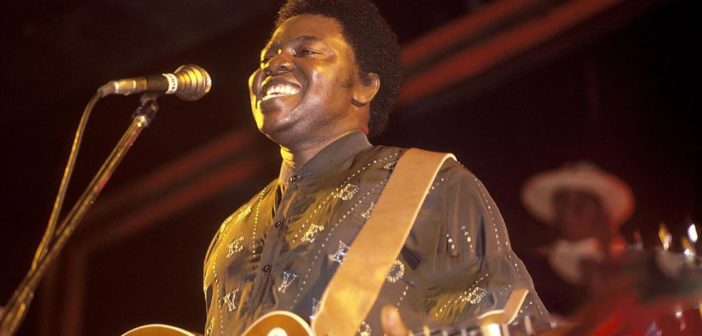By Lekan Alabi
Yesterday,Monday, 3rd April, 2017, the Chief Commander of juju (Miliki system) music, Evangelist (Professor) Ebenezer Remilekun Obey Fabiyi, MFR, popularly called “Obey Commander” or Simply “Obey” clocked 75 years old. We wish him many happy returns in good health, joy, honour and contentment. I liken the gifted musician, Obey to the buoy. Buoy, as a noun, is an object, which floats on the sea or a river to mark places as dangerous or safe for boats to go. For over five decades, “Obey” has been a buoy in the music world. As a verb, buoy is to make somebody feel cheerful or confident. I am, under poetic licence, using buoy as in the above headline, in the two senses for the subject of this tribute – Obey, who I dare say, is my older brother and friend, in the respectable – realms of friendship and brotherhood.
As if my dear readers did not know, I was the Chairman of Obey’s 70th Birthday Luncheon/Biography Launch/Idogo Hall donation Planning Committee in 2012. Modesty will not permit one to say that the ceremonies were successful beyond our dreams. Since 1974 when I was appointed the entertainment page editor of the now-defunct Sunday Sketch, in Ibadan, my pen has never ceased to flow in analyzing “Obey,” his band and music. I first appeared at a live performance of the then Ebenezer Obey-led International Brothers Band sometime in 1969 at a party hosted by Pa. Oyenuga (a bossom friend of the late Pa Oriade Oreyomi Wellington and Pa Obikoya) for his mother at Isale-Gangan, on Lagos Island. Today, the band is called “Inter Reformers Band”
The Chief Commander of Juju (Miliki) music, Ebenezer Obey was born at the famous Lagos Island Maternity Hospital on April 03, 1942, although his parents were from Keesi and Owu towns in Abeokuta, Ogun State. Ebenezer Remilekun Aremu Fabiyi took the nickname “Obey” at elementary school in Idogo, Ogun State where his parents plied their trades, because of his constant admonitions to his classmates to always “Obey first and complain later”. From a local band boy who cut his teeth under the late juju music icon, Fatai Rolling Dollar, in Lagos in the 1960’s, Obey emerged a maestro who re-wrote juju music history because he was talented, creative and had the guts to barge his way into the presence of the then expatriate Managing Director of Decca West African records company in Lagos, Mr. Kress. At 22, in 1964, oozing with self-confidence before the MD, though unknown and without a waxed record to his credit, Obey said, “I am a future star. Sign me on, and Decca will be the better for it”. The sagacious expatriate MD obliged the confident “future star” with an audition followed by a recording contract. How prophetic Obey was! He not only improved Decca’s turnover, he became a shareholder of the company, director and later its owner.
By the time he quit the stage in 1992, I had followed Obey’s musical career as a fan, columnist and “aburo” for a total of 27 years. When he resurfaced on the secular stage, dubbed “Special appearances”, I was there at the City People Magazine-organized show at an event centre in Ikeja, Lagos State in 2009. It started in earnest in 1965, from my listening to the International Brothers Band’s records to my regular attendance at the band’s live shows on the defunct Western Nigeria Television (WNTV, Ibadan), Africa’s first Television Station established in 1959. ‘Come, Let’s Dance’ programme, compered by that queen-of- the-tube-turned- lawyer, the late Auntie Toun Adeyemi. The former WNTV, Ibadan is now known and called, NTA Ibadan Network Centre, Agodi, Ibadan, Oyo State.
My first close contact with Obey’s band, however, came about as I said earlier in 1969. I had been invited by Deji and Tunji (now late) Wellington to Kola Oyenuga’s grandmother’s party at Isale-Gangan in the heartland of Lagos. There were three bands in attendance that night at Isale-Gangan. But the two great attractions were the late Ayinde Bakare’s Inner Circle Orchestra and the new sensation, Ebenezer Obey. I did a circuit of the bands, and eventually pitched my tent with Obey’s International Brothers Band. Those were the days when he, Olalekan Olorode, Sunny Ade (KSA) I.K. Dairo, Dele Ojo, Tunde Nightingale and others used to perform while seated. They would be inspired to rise to their feet as parties gathered momentum a la swirling beaded buttocks (O wa mbe) accompanied by heavy currency ‘rains’.
At this particular show at Isale-Gangan, I had the fortune of attracting a pretty Lagos dame who was enraptured by my natural Ibadanness of graceful dance steps and easy translations of idioms being churned out from the talking drum of Obey’s master drummer, Mutiu Jimoh alias “Mutiu Kekere.” As I discovered that night, Obey’s band had acquired a set of mini klieg lamps with multi-colour effects from the band’s tour of Britain that year which were flicked on each time the band was inspired by the audience gyration or the cash ‘rain’. The unique lighting effects really made the party blue. At a point, the dame dragged me right before the band and we both became good spectacle which attracted heavy currency ‘rain’ and high tempo beats from the band. The special ‘Omo-Ibadan’ composition by Obey that night still rings in my ears. Half of the money sprayed on us that night was expended by me the following Monday on that era’s psychedelic wears at Domino Stores in Lagos. How I wish that lucky lady is alive to read this.
Who knows?
I would later come across the International Brothers Band at ‘Havana Nights’ of the Sigma Club of the University of Ibadan and private parties. I remember the 1971 ‘Havana Night’ where Obey and his group played in the forecourt of the Trenchard Hall, Yusuf Olatunji ‘Baba l’Egba’ at the entrance and Fela’s Africa 70 band in the main hall. By 1974, I had become the entertainment / social page editor of the Sunday Sketch, thanks to the editor, the late Mr. Philip B. Adedeji. One was therefore the toast of bands, theatre groups, artistes, authors, etc wishing to capture public attention in the defunct Western State of Nigeria. I gave due coverage to Obey, Sunny, Animashawun, Baba l’Egba, Okonta and others, strictly on their high quality performances/works.
The truth can now be told that all the public encomiums poured on me by Obey and his band during their several live shows attended by me, with or without my wife, were not due to my naira power, but as a result of our good rapport. Much has been written and said about Obey’s band’s immense contributions to entertainment, social/cultural development, moral rectitude and soul inspiration. Emphasis must, however, be laid on the juju musician’s humility, discipline, and good disposition to all. His compositions are not only mature but mostly spiritual. Obey’s ability to hold his band together from the 1960s till date, although most lead members are either dead or retired, speaks volumes about his acumen and organizational ability. His foresight at establishing a viable conglomerate now managed by his family is an instruction to up-and-coming artistes not to fritter away the gains they make while the sun shines.
We praise God for the talent He bestowed on Obey. Earlier on, I mentioned the breakthrough given by the different motivators to Obey. We must not forget Mr. Kress of DECCA for his sagacity, former band members such as “Captain” Samson Ogunlade, Oke Aminu, Abiodun Koleoso and Monday John (all late). Israel Adio, Giwa Ojo Arigidi and Mutiu Jimoh Kekere also deserve commendation for their pioneering roles in the band. Kudos also go to committed supporters of entertainment in the 1960s and 1970s, the era in which Obey’s band blossomed. I wish to recall pillars of music like the late Uncle Yomi Onabolu, Pa Oriade Wellington Oreyomi, Pa Oyenuga, Pa Obikoya, Madam Julianah Onilegogoro, Uncle Bashiru Aderibigbe alias “Arizona” and our beloved late Aare Musulumi of Yorubaland, Alhaji AbdulAzeez Arisekola Alao.
Happy 75th birthday to the “Chief Commander.”
Chief Lekan Alabi, is a veteran journalist and the Agba-Akin Olubadan of Ibadanland.
Culled from The Guardian




